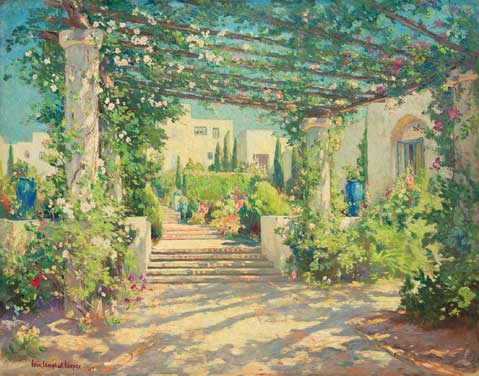Lasting Impressions: Colin Campbell Cooper
The Santa Barbara Historical Museum Shows California Impressionist

Defining Santa Barbara style is tricky. From the beginning, there has always been more to the aesthetic consciousness of our city than just the landscape and the fortuitous Spanish red tile and stucco could explain. In fact, the prime mover of Santa Barbara’s distinctive personality in the arts may be something that flows beneath these surfaces—the current of a fast-moving and cosmopolitan community dedicated to observing and celebrating the best not only of our region, but of the whole world. No better exemplar of this attitude can be found than Colin Campbell Cooper, the subject of the stylish exhibition at the Santa Barbara Historical Museum. In a follow-up to last season’s Guiding Lights, a group show that displayed work by the faculty of the Santa Barbara School of the Arts, Lasting Impressions is the first of a series of solo shows for these great teachers who inspired the formative Santa Barbara art scene of the 1920s and 1930s.
Cooper’s American International take on Impressionism flourished in an era of visionary civic endeavors. In bringing his skills with color, atmosphere, and context to subjects as different from one another as The Train Roundhouse in Salem, Massachusetts (1895) and The Palace Gate at Udaipur, India (1914), Cooper imagined a world in which even the most monumental of public edifices could be understood as manifestations of cultural identity and individual will.
The exhibition’s elegant catalogue explores the New York and Santa Barbara phases of Cooper’s career with energy and intelligence. Marshall N. Price unearths fascinating material concerning Cooper’s methods of composition in the well-known series of paintings he made of New York skyscrapers. He also makes a strong case for Cooper’s art as an important part of the ongoing dialogue about the aesthetic value of these new structures. Deborah Epstein Solon carefully lays out the evidence concerning Cooper’s move to Santa Barbara in 1921 and presents the artist’s later career in the context of the region and the times. Santa Barbara clearly struck a chord with this talented and worldly artist, and perhaps the best explanation for it can be found in the work he created here—picture after picture that delivers us into an exquisite experiment in hybrid beauty, the glorious resort of a truly cultured group of people.



